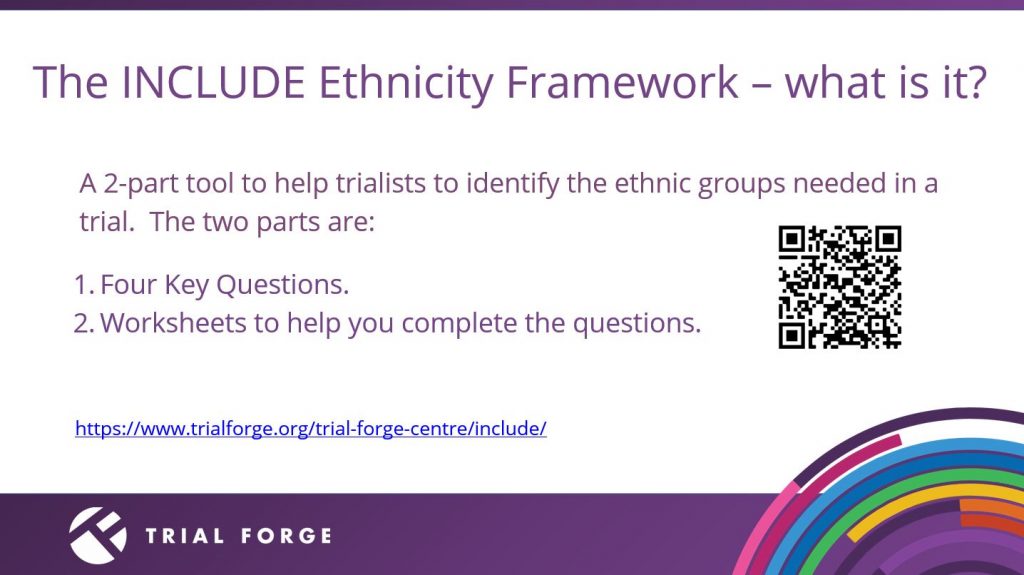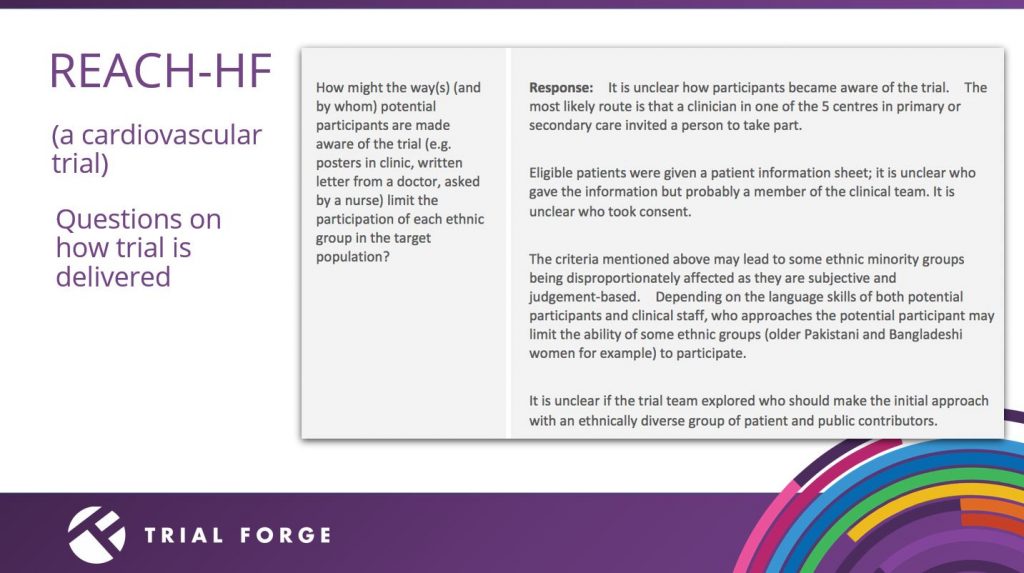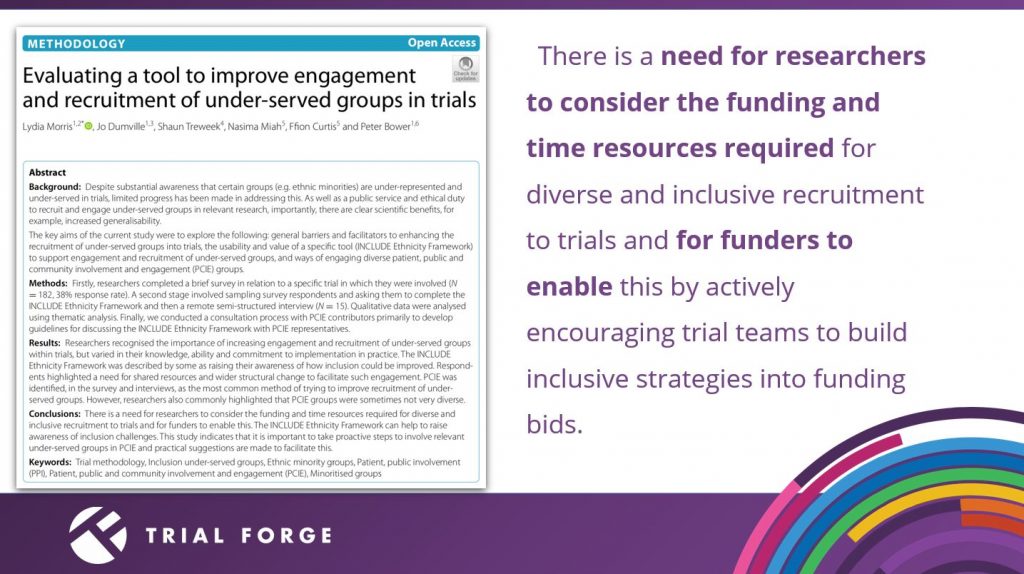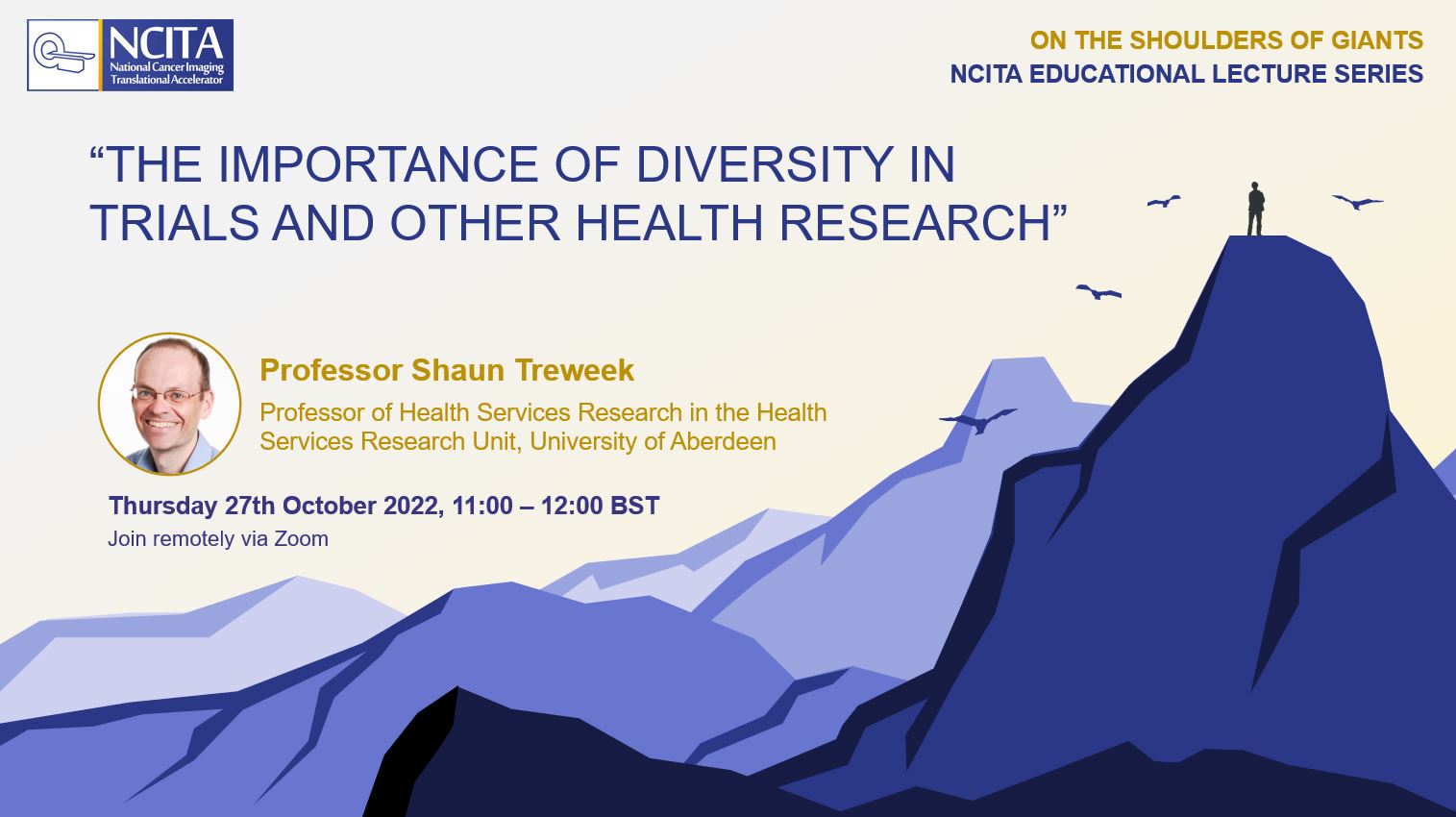On 27 October 2022, NCITA hosted the sixth and final lecture in the NCITA ‘On the Shoulders of Giants’ educational lecture series: ‘The Importance of Diversity in Trials and Other Health Research’ with Shaun Treweek, Professor of Health Services Research in the Health Services Research Unit at the University of Aberdeen.
Professor Treweek is leading an initiative called Trial Forge that aims to be more systematic about how we generate and use research evidence in making trial design, conduct, analysis and reporting decisions. In this lecture, Professor Treweek highlighted why we need to think more about who is in our trials, not only in terms of clinical characteristics, but also sociodemographic characteristics.
To watch a recording of the event please visit the NCITA YouTube channel.
It is very hard to put yourself into the shoes of someone who is not like you
Researchers have traditionally thought more about how many rather than who needs to be in our trials. If there are groups of individuals who we routinely do not involve in research due to the inadequate recruitment of those groups, then research outputs from trials are unlikely to consider their perspectives, leading to the potential for persistent inequalities in trials. These include groups of ethnic minority, socioeconomic disadvantage, age extremes, and impaired capacity to consent. A detailed example list of underserved groups can be found on the NIHR website.
“We should be thinking about what we might call socio-demographic criteria who are the people who bear the brunt of this particular illness or conditional problem and they are the people who we need to think about in our research”
Professor Shaun Treweek

How can we ensure greater representation and diversity in trials?
INCLUDE is an NIHR initiative to address the lack of representation in health and care research, with the vision to ‘provide better health and care through more inclusive research’. Professor Treweek and colleagues came together in 2018 to develop the INCLUDE Ethnicity Framework, a 2-part tool to help trialists and researchers consider the participation and involvement of people from different ethnic groups when designing trials.

The first part of the INCLUDE Ethnicity Framework includes four questions, to encourage trialists to really think about who should be in their trial:
- 1. Who should be in the trial? “Who are the people who have something to gain from your intervention, your initiative, your treatment, your new way of delivering care”
- 2. Will the people identified respond to the treatment differently? “Are there things about the disease area or the condition that individuals from these different ethnic groups may respond to differently? What we’re really thinking about here are things like the perception of that condition or stigma around that condition”
- 3. Will the intervention itself make it hard for some people to be involved? “It might be not only the thing itself, but where it’s delivered or who delivers it or how it’s delivered or when it’s delivered - those sorts of things will that make it easier or harder for some people to be involved”
- 4. Will the trial design make it hard for some people to be involved? “Things that you have built into your design that might make it easier or more difficult for some individuals of some ethnic groups to take part… so things may be about measurement - who makes the measurements, where are the measurements being made, how often are they, what data are we collecting”
Applying the INCLUDE Ethnicity framework retrospectively to a number of trials highlighted the lack of important data captured during those trials, such as the ethnicity of participants, or routes of recruitment into the trial.

Professor Treweek and his colleagues are also working on a range of other frameworks, including ‘socioeconomic disadvantage’ and ‘impaired capacity to consent’ groups, as well as looking into potential overlap between different frameworks to maximise efficiencies for trial teams. Whilst the frameworks are designed to ensure trials are relevant to the people for whom the results are intended for, it is important that both funders and researchers acknowledge that incorporation of frameworks and engagement with underserved groups will take time and money.
“There is a need for researchers - people like me - to recognize the time and funding that is required to do this well and that means also to actually engage with ethnic groups that we may not have engaged with routinely in the past; so that takes time and it will take money, and for funders therefore to facilitate this by making those resources available, making the money available and recognizing that to do this well means that the research will take longer.”
Professor Shaun Treweek

Priorities for trial teams
In summary, we need to think more carefully about who we involve:
- Think explicitly about who needs to be in your trial.
- Ask directly and engage - it is very hard to put yourself into the shoes of someone who is not like you.
- Use the INCLUDE Framework to prompt both discussion and evaluation.
- Compare your trial population to the population of people who might benefit.
“It genuinely is very hard to second-guess some of the challenges that individuals from groups other than your own, […] to imagine what life is like, what the decisions that people make, what are the basis for those decisions. […] We have to either find that information in the literature or ask directly, and asking directly I think is absolutely essential - engaging with individuals from the groups that you identify as important”
Professor Shaun Treweek
Useful resources
The Trial Forge website includes resources to assist with improving trial diversity: https://www.trialforge.org/trial-forge-centre/include/
About the speaker
Professor Shaun Treweek is a health services researcher interested in efficient trial design, particularly around inclusive recruitment and retention and the effective presentation of research evidence. He led the development of the NIHR INCLUDE Ethnicity Framework, a tool to help trialists design inclusive trials and PRECIS-2, a tool to match trial design decisions to what the users of the results need. He leads an initiative called Trial Forge (http://www.trialforge.org) that aims to be more systematic about how we identify, generate and use research evidence in making trial design, conduct, analysis and reporting decisions. In 2019 Trial Forge won the international Cochrane-REWARD Prize for outstanding work in reducing waste in research. Finally, Professor Treweek is an Editor-in-Chief of the journal Trials.
About the ‘On the Shoulders of Giants’ lecture series
‘On the Shoulders of Giants’ is a series of educational talks where experts bring their perspectives to encourage and challenge wider thinking within the cancer imaging research community. See below for other lectures in the series:
- April 2022: ‘Screening for Cancer: The Good, The Bad and The Ugly’ with Prof. Michael Baum. Link to blog & recording here.
- May 2022: ‘Is Pursuing ‘a Passion for Science’ a Position of Privilege?’ with Dr Heather Williams MBE. Link to blog & recording here.
- June 2022: ‘Academia & Industry: What are the Ingredients for Successful Collaborations?’ with Kieran Murphy and Prof. Evis Sala. Link to blog & recording here.
- Striving for Evidence – With and Without a Randomised Controlled Trial’ with Professor Tom Treasure. Link to blog & recording here
- September 2022: ‘Talking with patients about sad, bad and just plain difficult things’ with Prof. Dame Lesley Fallowfield. Link to blog & recording here.


